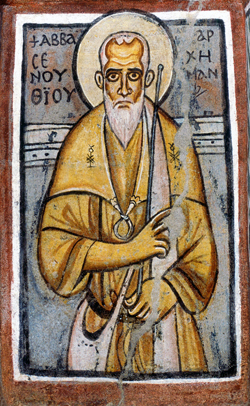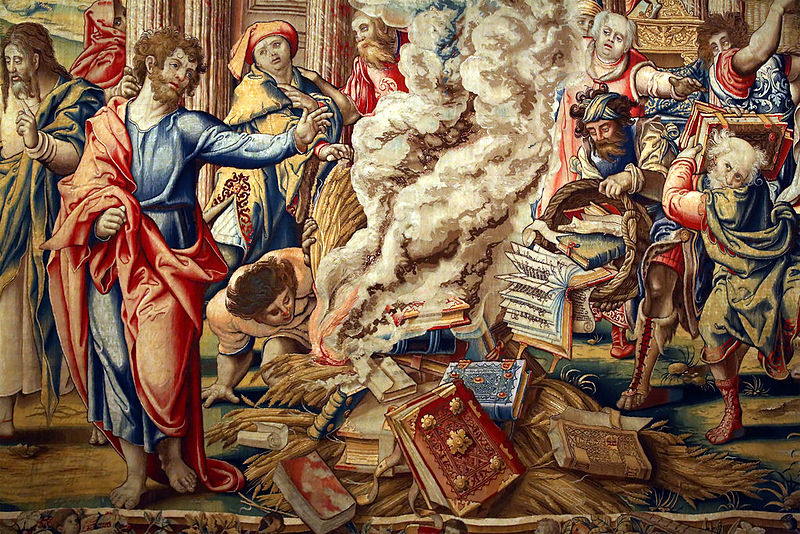Shenoute the Great, a.k.a. Saint Shenoute the Archimandrite (347-465 C.E.), the abbot of the White Monastery in Egypt, is considered a saint by the Oriental Orthodox Churches, and is one of the most renowned saints of the Coptic Orthodox Church.
In ‘Merciful Savagery’, chapter fifteen of The Darkening Age: The Christian Destruction of the Classical World, Catherine Nixey wrote:
______ 卐 ______
Monks—anonymous, rootless, untraceable—were able to commit atrocities with near impunity. ‘Our angels’ some Christians called them. Rubbish, said non-Christians. They were not angels but ignorant, boorish thugs, men in appearance only who ‘led the lives of swine, and openly did and allowed countless unspeakable crimes’. As the author Eunapius wrote with sardonic distaste: ‘in those days every man who wore a black robe and consented to behave in unseemly fashion in public, possessed the power of a tyrant, to such a pitch of virtue had the human race advanced!’ Even a wholeheartedly Christian emperor mutedly observed that ‘the monks commit many crimes’…
For as they went through the door, the monks found themselves in a room whose air was heavy with incense and where the light of numerous lamps glimmered on countless carved surfaces: they were in a chamber full of heathen idols. Here was a statue of the lecherous parricide Zeus; there was one of Zeus’s father, Kronos; there was the deceitful Hecate…
They smashed the statues and threw the broken fragments in. The waters swirled, then swallowed the remnants of Gessius’s paganism without a trace. A nest of Satan had been emptied.
Later, when Shenoute was criticized for breaking and entering into another man’s house, he was utterly intransigent. ‘There is no crime,’ he declared, ‘for those who have Christ.’
The laws of the land may not have mattered to Shenoute. The laws of his monastery were, on the other hand, to be obeyed at all times. And there were a lot of them.
More than five hundred rules circumscribed every aspect of Shenoute’s monks’ lives from the moment they got up, just before dawn, to the moment that they went to sleep, and everything they did in between. There were rules on what the monks wore; what they ate (precious little, mainly bread); when they ate (infrequently); when they prayed (relentlessly); how they prayed (audibly); where they had their hands when they prayed (emphatically, for some reason, not near their ribs); how they slept (alone and without erotic desire); how they washed (infrequently, without looking at one another’s bodies or their own); whether or not they shaved (absolutely not, except with permission, for: ‘Cursed shall be any who shaves himself…’); and even where they defecated. As one rule (that perhaps raises more questions than it answers) explained: if anyone needs to ‘defecate into a pot or a jar or any other vessel… they shall ask the Male Eldest’. Once inside a monastery, the monk’s life was no longer his own…
The monastery even controlled minds—or attempted to. From the moment of waking, monks in Shenoute’s monastery were rarely at rest, their days filled with a punishing regime of physical work and prayer. They were even more rarely silent. Lest their minds wander onto ungodly paths as they performed the tedious basket-weaving that was a monk’s lot, they were encouraged to chant constantly—prayers, or passages of scripture—anything at all. Just as the weaving chained hands, keeping them from sin, so the chanting chained wandering minds. It has been said that the monastery at work would have sounded like nothing so much as a swarm of bees in flight.
Why did people sign up for such an unappealing life? It is possible that they didn’t know the full extent of its austerity when they joined. Monks who entered Shenoute’s monastery were not presented with a comprehensive contract at the door, or read their rights upon arrival. Instead, monastic discipline was more of a revealed religion; the full extent of the White Monastery laws being only slowly explained to each new entrant, little by little, once they were already inside. This may have been less Machiavellian than it sounds: to hear all the laws in one go would have made for a long evening. Nevertheless, by the time monks fully realized the form of their new life they would—now bereft of their money, their land and even their own clothes—have been almost powerless to leave it.
Once a monk had given himself to his new monastic master he had to obey him—or face the consequences. Numerous rules begin with the formulation ‘Cursed be…’ Cursed were those who didn’t give all their wealth to the monastery; cursed were those who shaved without having been ordered to; cursed were those who looked at another monk with desire. If a monk ate, say, the forbidden fruit of cucumber at the wrong time then, the law informed him, ‘he sins’. At least sixty of the rules were devoted to sexual transgressions. Looking desirously at the nakedness of your neighbour while he washed was wrong; as was staring ‘with desirous feeling’ at your own nakedness; those who sat ‘close to one’s neighbour with a filthy desire in their heart’ were also cursed’.
Note that last one: ‘with a filthy desire in their heart’. No sin had been committed. The mere intention of sin was now a sin in itself. In Shenoute’s monastery even thoughts were policed. ‘Can any hide himself in secret places that I shall not see him?’ the Lord had asked. The answer from the White Monastery at least was a resounding no. As this new generation of hard-line Christian preachers constantly reminded their congregations in fierce, hectoring speeches, there was nowhere to hide from the all-seeing eyes of the Lord…
Religious intensity was not new. Greece and Rome had known those who took religion to extremes and who had gone about their lives feeling humbled and crushed by fear of the gods. Generally, though, religious fervour had been a private passion—and it had kept within the confines of the law. But as Christianity gained control, religiosity started to become a public duty and would, with self-righteous pride, overstep the boundaries of the law. Some of the most important thinkers of the era supported such behaviour. If necessary, one must make oneself obnoxious. One must stop at nothing—even harming other people—in the service of the Lord. There is, after all, no crime for those who have Christ.
To punish a sinner violently, to flog them, beat them, make them bleed—this was not to harm them but to help them, by saving them from worse punishments to come. Shenoute worried that if he didn’t beat the monks in his care then he was offending God. Punishments used against erring Christians even in Augustine’s time ranged from the confiscation of property to being barred from church, beatings, and floggings with rods. It is better, said Augustine, ‘with severity to love, than with gentleness to deceive’. This was not cruelty. Did not the shepherd bring wandering sheep back to the flock with his rod? The Church, he wrote, ‘persecutes in the spirit of love’.
This was holy violence. Jesus may have told his followers that they should, when struck by an aggressor on their right cheek, offer him the other, but his fourth- and fifth-century followers were less forgiving. As John Chrysostom explained, if a Christian happens to hear someone blaspheme then, far from turning their own cheek, they should ‘go up to him and rebuke him; and should it be necessary to inflict blows, spare not to do so. Smite him on the face; strike his mouth; sanctify thy hand with the blow.’ Murder committed for the sake of God, argued one writer, was not a crime but actually ‘a prayer’.
Some of Chrysostom and Shenoute’s methods of control would be mirrored, a hundred or so years later, for very similar reasons, in imperial law. When the emperor Justinian came to power in AD 527, he set about reforming the morals of his subjects with a zeal and a legal thoroughness as yet unseen. He had a good incentive: if he did not punish them then, he firmly believed, God would punish him.
Civil officials now found themselves required to enforce laws about what went on in private homes. Church officials found themselves pressed into service as de facto spies. Roman emperors had always used informers—delatores. Now, they were put to the service of the Church. Men of all ranks were required to become informers. Any breach of the laws was to be reported.
Bishops were required to become the emperor’s spies and report back on their fellow officials. If they refused or failed in their duties, then they themselves would be held accountable. Among those whom the clergy were tasked with reporting on were actors, actresses and, as one revealing little law added, prostitutes ‘who wore monastic habits’. The punishments could be terrible. If a nurse aided and abetted an affair of a young woman in her charge, she would be punished by having molten lead poured down her throat. Correction was paramount. Justinian, as the chronicler Procopius put it, was determined to ‘close all the roads which lead to error’.







